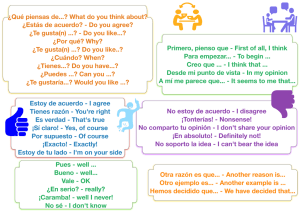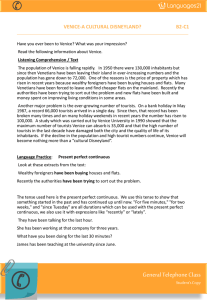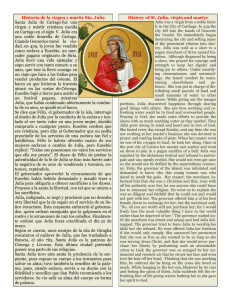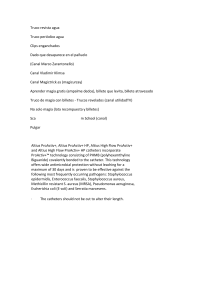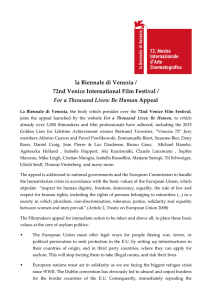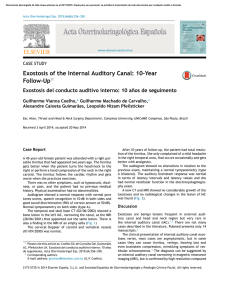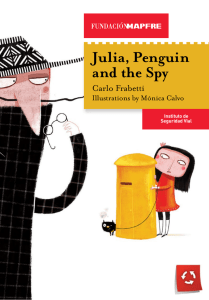Oposicion Policias 2015 EXAM C _Para publicar
Anuncio
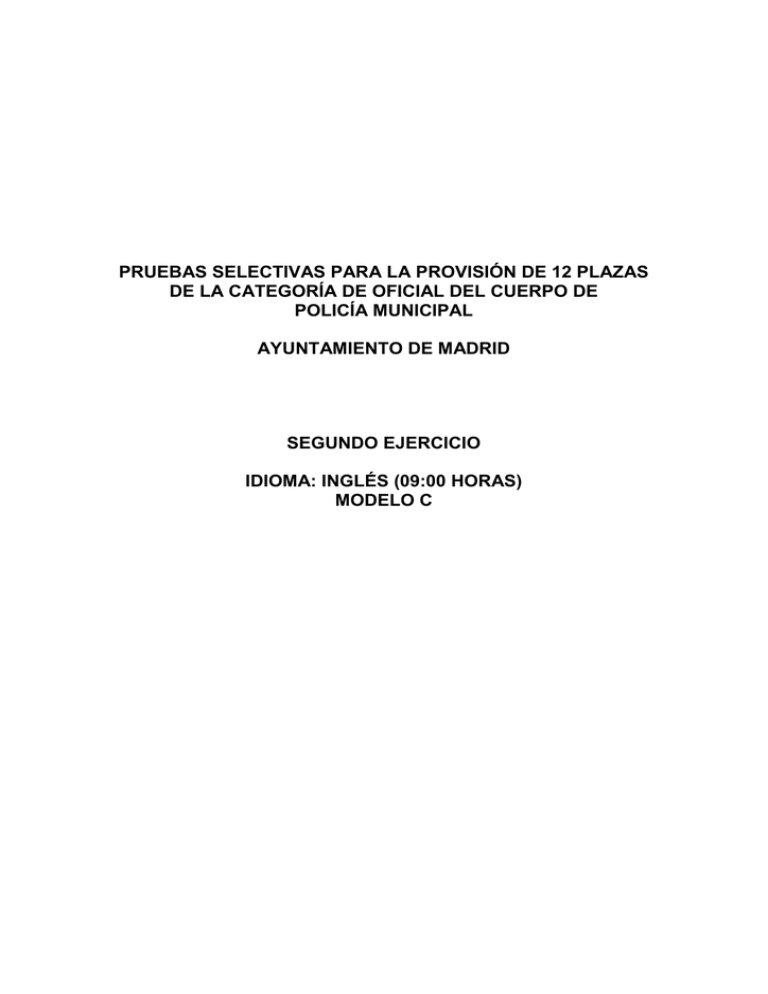
PRUEBAS SELECTIVAS PARA LA PROVISIÓN DE 12 PLAZAS DE LA CATEGORÍA DE OFICIAL DEL CUERPO DE POLICÍA MUNICIPAL AYUNTAMIENTO DE MADRID SEGUNDO EJERCICIO IDIOMA: INGLÉS (09:00 HORAS) MODELO C PRUEBA DE IDIOMA PARA ACCESO A LA CATEGORÍA DE OFICIALES DEL CUERPO DE POLICÍA MUNICIPAL DEL AYUNTAMIENTO DE MADRID TEST – MODELO C Choose the correct translation of the following sentences: 1. Eso no puede traducirse al español. A. That can’t be translated into Spanish. B. That isn’t translated in Spanish. C. There is no translation into Spanish. 2. ¿Qué quieres que haga? A. What are you wanting me to do? B. What do you want me to do? C. What you want me to do? 3. ¿Puede decirme cuál es su nombre? A. Can you tell me what is your name? B. Can you tell me what your name is? C. Cand you tell me what name are you? 4. Quiero que me termines esta lista. A. I want you finish this list. B. I want you to finish my list. C. I want you to finish this list for me. 5. Este es el octavo libro en la serie. A. This is the eight book in the series. B. This is the eighth book in the serie. C. This is the eighth book in the series. 6. Dedica tu tiempo a leer novelas. A. Dedicate your time to reading novels. B. Devote your time to read novels. C. Devote your time to reading novels. 7. La vida tiene sus altibajos. A. Life has its ups and downs. B. Life has its ways up and down. C. The life has its ups and downs. 8. Bueno, ¿y qué? A. Well, so what? B. Good, so what? C. Good then, what now? 9. Ojalá fuera verdad todo eso. A. I hope all that was true. B. I wish all that was true. C. I wish all that were true. 10. Todo parece cuesta arriba. A. Everything is like uphill. B. Everything looks like uphill. C. Everything seems uphill. 11. Cambiemos de tema A. Change the subject. B. Let’s change the subject. C. You change the subject. 12. Me deprimo fácilmente. A. I depress easily. B. I get depressed easily. C. I get up and down easily. 13. Depende de qué quieres saber. A. It depends on what do you want to know. B. It depends on what want to know. C. It depends on what you want to know. 14. Aunque ella le caía bien, nunca se lo dijo a él. A. Although she was very fond about him, she never told him. B. Although she was very fond of him, she never told him. C. Although she was very fond with him, she never told him. 15. Soy alérgico a la cafeína. No debería beber nada de café, pero me gusta mucho! A. I’m allergic to caffeine. I shouldn‟t drink any coffee, but I like it so much! B. I’m allergic about caffeine. I shouldn‟t drink any coffee, but I love it so much! C. I’m allergic with caffeine. I shouldn‟t drink any coffee, but I like it so much! 16. Fue Julia Roberts quien ganó el Oscar por Erin Brokovich. A. It was Julia Roberts who won the Oscar for Erin Brokovich. B. It were Julia Roberts who won the Oscar for Erin Brokovich. C. She was Julia Roberts who won the Oscar for Erin Brokovich. 17. El crimen se denunció hace tres meses pero la policía sigue investigándolo. A. The crime was reported three months ago but the police are still investigated. B. The crime was reported three months ago but the police are still looking forward it. C. The crime was reported three months ago but the police are still looking into it. 18. Cuando estaba en paro me tuve que mudar con mis padres. Fue la solución más barata. A. When I was unemployed I had to go live in with my parents. It was the cheapest solution. B. When I was unemployed I had to move in with my parents. It was the cheapest solution. C. When I was unemployed I had to move out with my parents. It was the cheapest solution. 19. Me encanta la gente que es optimista sobre el futuro. A. I love people who are optimistic about the future. B. I love people who are optimistic in the future. C. I love people who are optimistic with the future. 20. ¡La gente que es famosa sólo por su vida personal me pone enfermo! A. People who are famous only because their personal life make me feel sick! B. People who are famous only due to their personal life make me feel sick! C. People who are famous only for their personal life make me feel sick! READING You are going to read an article about a man who lived in Venice in 1733. MY NEW HOME IN VENICE, 1733. Uncle Leo gives me a suspicious look when I call this place the 'Scacchi Palace’. It is really a house, called Ca' Scacchi in Venetian. Anywhere else in the world this would surely be regarded as a palace, although it is one in need of a little care and attention. Our house is by the side of the little San Cassian canal and a small square of the same name. We have a door which leads onto the street and two entrances from the water. One runs under a grand, rounded arch into the ground floor of the house, which, as is customary in the city, is used instead of a cellar for storing things. The second is used for our commercial activities and it is situated in another building which is three storeys high, attached to the north side, towards the Grand Canal. Finally, there is yet another exit: a wooden bridge, with handrails, runs from the first floor of the house between the two river entrances straight over the canal and into the square itself. Consequently I can wander over it in the morning and find fresh water from the well in the centre of the square while still rubbing the sleep from my eyes. Or I may call a gondola from my bedroom window, find it waiting for me by the time I get downstairs and, just one minute later, be in the middle of the greatest waterway on earth: the Grand Canal of Venice. The house is almost 200 years old, I am told, and built of bricks of a rich dark brown colour. It has elegant arched windows and green-painted shutters to keep out the cruel summer heat. I live on the third floor in the third room on the right with a view over the canal and the square. When I lie in bed at night I can hear the chatter and songs of the passing gondoliers and the conversations in the square nearby. I understand why Uncle runs his business here. The prices are not too steep. The location of the house is near the city centre and easy for our clients to find. Furthermore, the printing trade has many roots in this area of Venice, even if some of the old publishers from the area no longer exist. Adapted from Lucifer's Stedowty by David Hewson For questions 1-5, choose the answer (A, B, C) which you think fits best according to the text. 21. What do we learn about the house in the first paragraph? A. It’s being repaired. B. It's an impressive building. C. It used to be a palace. 22. In what way is the house typical of Venice according to the writer? A. People live and work in the same building. B. The storage area is not below ground. C. There are several ways of entering it. 23. What does ‘it’ refer to in the second paragraph? A. The family business. B. An entrance. C. A building. 24. What do we understand about the house from the third paragraph? A. The house has its own gondola. B. The writer’s bedroom is on the ground floor. C. There is no supply of fresh water in the house. 25. What does the writer say about his uncle's printing business in the fourth paragraph? A. His printing business is more expensive than others. B. The business has plenty of customers. C. There are other similar businesses in the district.

